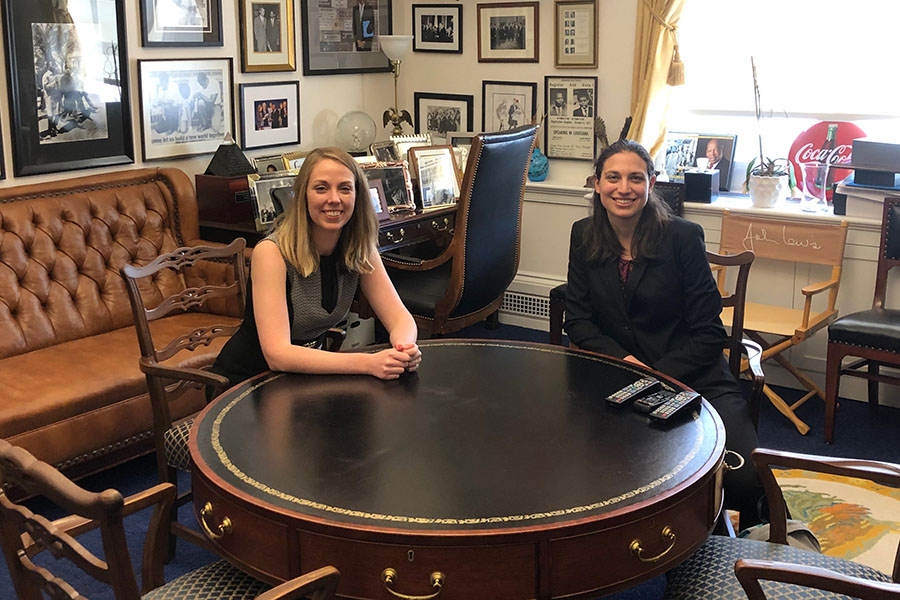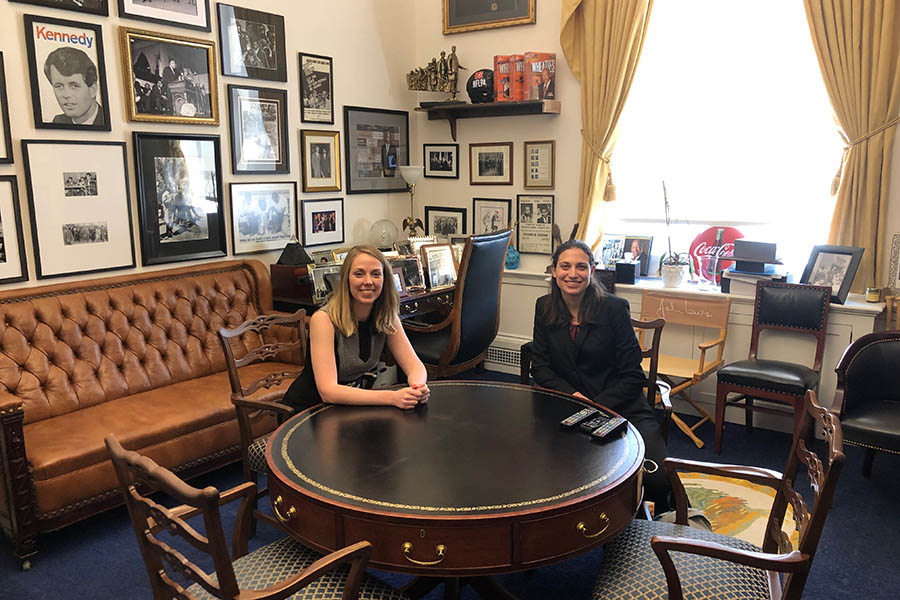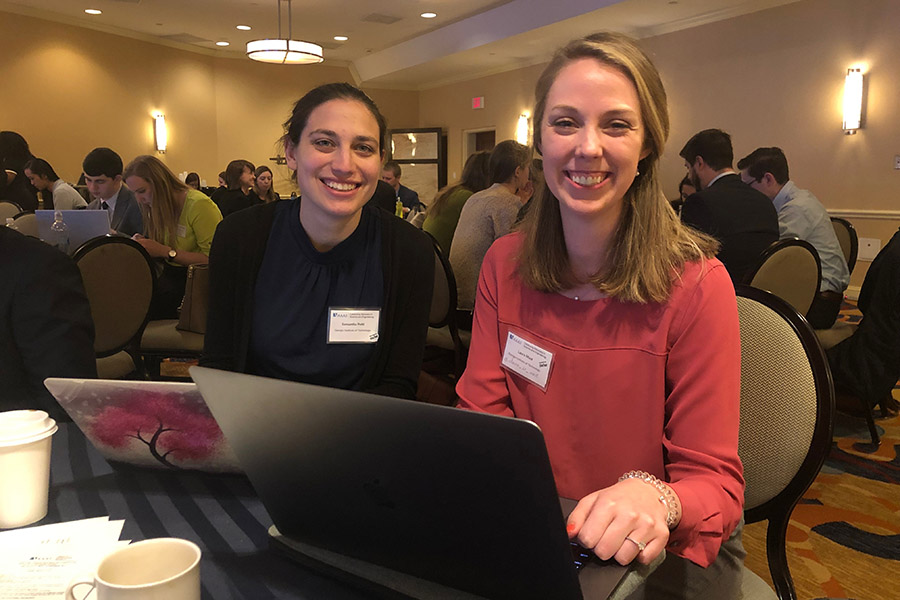
 Environmental engineering Ph.D. student Laura Mast, left, and math Ph.D. student Samantha Petti visit Georgia congressman John Lewis' office. They were unable to meet with Lewis, but they did have conversations with staffers from several Georgia representatives' offices during the Catalyzing Advocacy for Scientists and Engineers Workshop, a three-day crash course in federal policymaking and science advocacy. Mast and Petti were the only two students from Georgia Tech who attended. (Photo: Robert Knotts) |
Environmental engineering graduate student Laura Mast spent a few days last week in the nation’s capital at a workshop where she learned the nitty-gritty of federal policymaking and how to advocate for science.
Mast was one of two Ph.D. students from Georgia Tech at the American Association for the Advancement of Science workshop Catalyzing Advocacy for Scientists and Engineers. It amounted to a crash course in how the federal government funds science and ended with students meeting congressional staffers and lawmakers.
After she returned to Atlanta, Mast offered some thoughts about the experience.
“Why should you and your science be funded?”
Every graduate student I know can answer this question. They can describe how hard they’ve been working, the late nights, the completed (and then redone) experiments, what their results tell them, and how this work fits into their field more broadly.
But not all could explain its significance to a layperson, child or adult, and fewer still could explain it to a perhaps more intimidating audience: a member of Congress.
|
Last week, I had the pleasure of learning to translate my research and more at the Catalyzing Advocacy for Scientists and Engineers Workshop. We spent two days wading into the weeds of how federally funded science works: the myriad of agencies involved, how federal R&D appropriations works, and best practices for communicating with policymakers. Day three was dedicated to putting these new skills to work on the Hill, meeting with members of Congress and legislative staff on the Hill.
Our workshop focused on science policy in two different ways: first, that science can provide evidence for making policy decisions, and second, that policy dictates what science is prioritized and funded.
The latter was more eye-opening for me. As a graduate student, I have some experience on what it takes to apply for grants, but how money moves from taxpayers to our labs has always been a black box. I learned that R&D funding, for example, largely comes from discretionary spending (in contrast to mandatory spending, like Social Security, and interest payments).
Split into teams of House and Senate, we spent an hour working through a federal budget, trying to balance the budget while still maintaining our ground as much as possible on our own priorities. (I’m sad to report my team ultimately was not able to balance the budget.
“We want it all, and we want to pay for none of it,” was how one of the workshop’s presenters put it. Judy Schneider is a 40-year veteran of Capitol Hill and credited with training hundreds of members of Congress. She also noted that more than 10,000 pieces of legislation are introduced in a two-year session, but ultimately, only around 200 become law.
For legislative staffers and Congress members alike, deciding what to prioritize, then, is crucial, and they have to stay abreast of hundreds of different issues, from the local district level all the way up to international policy. Sean Gallagher, an AAAS Senior Government Relations Officer, compared it to drinking from firehose, noting that staffers find visits from scientists and engineers helpful to keep up on hot new science.
 Georgia Tech Ph.D. students Samantha Petti, left, and Laura Mast at the American Association for the Advancement of Science workshop Catalyzing Advocacy for Scientists and Engineers. (Photo Courtesy: Laura Mast) |
I experienced this firsthand as we met with legislative staffers. Along with fellow Georgia Tech Ph.D. student Samantha Petti and Tech’s lobbyist, Robert Knotts, I met with Michael Northrop, who works with Rep. Drew Ferguson (R-West Point), and Allison Blankenship, who works with Rep. Lucy McBath (D-Marietta). These aides explained to us that they’re responsible for broad policy portfolios, covering news and legislation relating to science, technology, telecommunications, agriculture, commerce, and more. Being able to share our passion for our research and how critical federal funding has been for us in our graduate student careers with these staffers — plus hearing what’s important to them — helped me connect my own research with, quite honestly, the people and mechanisms that make it possible.
We also saw another process at work: a House judiciary subcommittee hearing. The hearing, “Lost Einsteins: Lack of Diversity in Patent Inventorship and the Impact on America’s Innovation Economy,” included testimony from Ayanna Howard, the chair of the School of Interactive Computing and the Linda J. and Mark C. Smith Chair Professor. She testified about her challenges in applying for patents (she has three). After the hearing, we all met with Rep. Doug Collins (R-Athens), who had invited Dr. Howard to testify. As an entrepreneur and small business owner myself, I was heartened to see that improving access to pro bono patent clinics and online resources was supported broadly on both sides of the aisle, and I was grateful to be able to share my experience applying for patents with Congressman Collins.
Meeting people from both sides of the aisle showed me something else important: folks on the Hill are there because they want to make things better for people. Their priorities might be different, but that’s in part because they’re people, just like us, trying to handle complex problems.
Fortunately for us, that makes advocating for science easy. Complex problems are our bread and butter, and science, broadly, has dramatically improved the lives of all people on earth.
So I have a short pitch to my fellow scientists and engineers: this is an unprecedented opportunity. Your staffers and representatives want to hear from you. Call them, visit them here in Georgia or in D.C., write an op-ed and send it to them. Start to build a relationship with them. They’ll see that you care, and they will come to trust you.
Related
- U.S. Rep. Doug Collins
- U.S. Rep. Drew Ferguson
- U.S. Rep. Lucy McBath
- Judiciary Subcommittee Hearing: “Lost Einsteins: Lack of Diversity in Patent Inventorship and the Impact on America’s Innovation Economy”
- American Association for the Advancement of Science Catalyzing Advocacy for Scientists and Engineers Workshop
